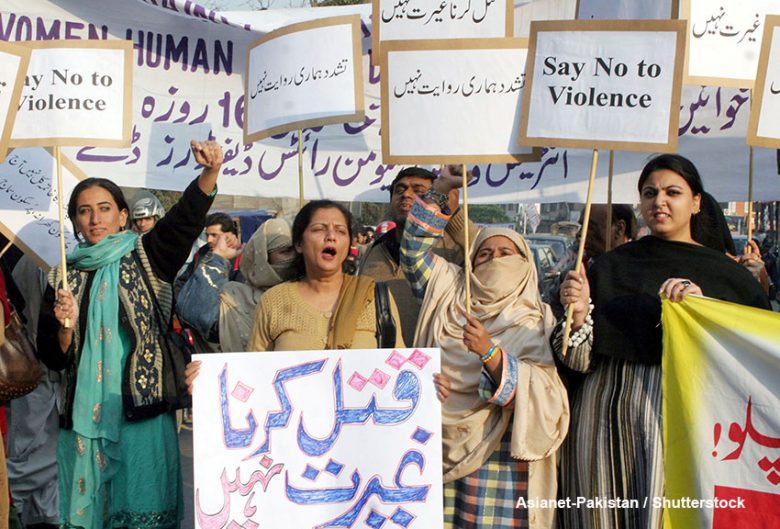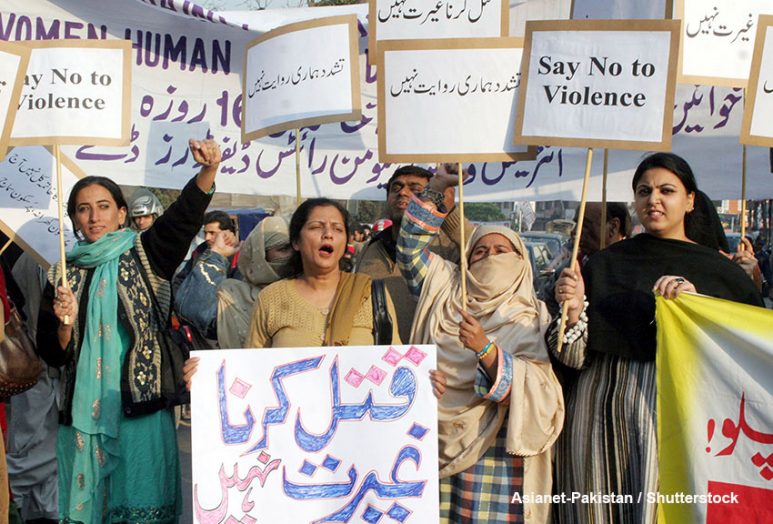By Saba Chaudhary
On 6 July 2021, a horrifying video of a couple being tortured and harassed caused uproar among Pakistani social media users. The video was shared on Twitter, violating the victim’s privacy via an unknown account. The fear, the pain and helplessness felt by the girl, seen in the room full of men reflects state complicity and the power imbalance men have, allowing them to abuse and threaten women. The incident took place at an apartment in Islamabad owned by a man named Usman Mizra who was the person who eventually tortured the couple.
The social media furore triggered the hashtag #ArrestUsmanMirza to trend on Twitter, prompting activists to flood social media with rage. Authorities were alerted to the trending hashtag and the perpetrators were apprehended within hours.

However, violence against women is not an isolated incident in Pakistan. Just one day before that video leak, a video of two brothers beating their sister with a hammer went viral. Both horrifying videos offer a glimpse of what women go through daily. Seeing and reading about such incidents in our social media feeds is stressful and upsetting, however, it has been the only way for women to gain awareness of other people’s realities in the absence of wider discussions about the current reality for women in the country.
Nighat Dad, a Pakistani lawyer and online activist has been very vocal on Twitter after the first incident.
“As social media is becoming a tool for shedding light on injustices in society, we need to have a larger conversation about consent of survivors and how to make cases viable without causing further harm to them,” she wrote in a thread following the incident.
Following that disturbing incident many people came together to share their traumatic experiences by unpacking horrendous statements and unfurling past experiences as they off-loaded their burdens online. Unfortunately, it is not the first time people in Pakistan witnessed such stories as newspapers are flooded with headlines about violence against women on a daily basis.
“The most bizarre thing happened to me when someone made a fake account and accused me of horrible crimes, tagged many journalists and activists. No one paid attention to it because it was clearly a fake account. All this happened because I exposed people who made death threats and rape threats against women. I posted their screenshots, their names and details and that is how they reacted,” Ammar Gilani a lecturer, activist and a student counsellor tells Media Diversity Institute.
Although activists are claiming online spaces, digital advocacy is becoming extremely difficult. In October 2020 Pakistani authorities approved a draft policy in order to regulate social media; however, this policy is seen as an attempt to control content which would consequently suppress dissent.
At the same time, when someone shares their story on social media, they are often met with threats and online hate similar to the ones Ammar Gilani faced.
Gilani stresses out the importance of speaking out for women and trans’ rights in Pakistan, but he highlights the difficulties of occupied online spaces with such support.
“In a country like ours, it’s hard to speak up against certain things. Speaking for LGBTQI+ rights and women’s rights means that you will get a lot of abuse from internet trolls,” he tells Media Diversity Institute.
“I think just being a woman online makes you hyper visible, regardless of what you talk about because you know, just by virtue of your gender, people think that you shouldn’t be occupying this public space, which is basically like any online space. And secondly, people think that they can say whatever they want to say to you, like you get a lot of unsolicited opinions and comments from various people,” says Zoya Rehman a special project manager at Media Matters Democracy and a researcher who is working on gender and legal issues from multidisciplinary approach through her practice and research.
However, online activism should be approached carefully and not as the only form of action.
“I don’t think that online activism is something that can be done in isolation. It has to be linked to grassroots struggles. Otherwise I don’t think it’s very impactful if everything you do is primarily online, but then there are a lot of people and women also, who are not able to leave their homes, for whom like online spaces become a key sort of avenue for speaking out against various forms of injustices and abuses and a lot of disabled people even who may not have access to physical spaces or at least may not have that access very easily are able to use technology to their advantage also”, Zoya Rehman adds.
Rehman believes that class barriers that we see being replicated on social media need to be overcome as well.
Benazir Shaikh, a social worker and public speaker, told Media Diversity Institute, that social media has impacted our lives in so many ways, many voices that appear on electronic media and newspapers become invisible but social media raises those issues. Issues raised on social media posts have more impact than issues raised on electronic media. When we talk about traditional media, some cases only become headlines of newspapers. However, things seem to be shifting. Although in the past grassroots activism was exclusive of those who lived in cities, online activism provides a more inclusive space.
Shaikh shared the example of Julie Awan, a trans activists. Awan gained attention on social media for speaking against discrimination, harassment marginalization and domestic violence. Her example shows social media has also given a space to trans activists who were neglected in the past. While the COVID-19 pandemic has shifted activism from streets to screens, from demonstrations to isolation, and from mass gatherings to zoom meetings, the picture is much more different proving that the path for gender e-activists in Pakistan is a long and arduous journey. Online activism has uncovered the dark truths of society and social media has become a tool for a more diverse environment. However, everything e-activists have gained so far could end soon. The suppression of dissent in the country through the introduction of law that would control the internet could potentially lead e-activists to self-censorship which will negatively impact diversity in the country.
Photo Credits: Asianet-Pakistan / Shutterstock

